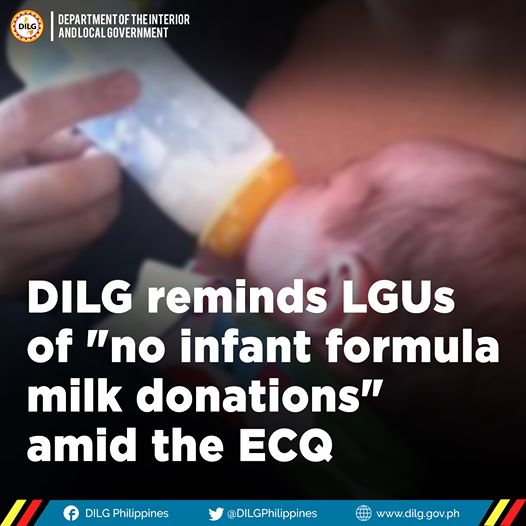
(Eagle News) – The Department of Interior and Local Government (DILG) reminded local government units of the ban against including infant formula donations in the distribution of emergency food packs to their constituents.
“[W]hile milk donations per se are not prohibited items for distribution to communities, infant formula milk donations are banned under the regulations issued by the Department of Health and adopted by the DILG”, the department said in a statement.
“May ilang LGUs na ang namigay ng milk formula kasabay ng distribution nila ng food aid (There were some LGUs who included milk formula in distributing food aid). While the intent to help is laudable, our health experts have advised against it. Hindi pa rin mapapantayan ang nutrisyon ng breastmilk (There is no substitute for breast milk). Let’s promote, protect and support exclusive breastfeeding only for infants 0 to 6 months old,” DILG Undersecretary Jonathan Malaya said in the statement.
He clarified however that other types of milk for older children and adults are allowed.
– Exclusive breastfeeding for infants 0-6 months old –
Malaya also asked LGUs to take heed of the National Nutrition Council’s Nutrition Cluster Advisory No. 01 series of 2020, or the Guidelines on LGU Nutrition Actions Relative to COVID-19, which recommends the promotion, protection, and support of exclusive breastfeeding for infants 0-6 months old.
Under the advisory, “[b]reastmilk substitutes that undermines breastfeeding such as infant milk formula, powdered milk, and other milk; feeding bottles, teats, and commercial baby food donations are NOT allowed and should NOT be included in the general distribution of emergency food packs”.
Instead, mothers or caregivers in affected or at-risk areas are advised to seek early medical care and follow the instructions of their health care provider in case they or their child show symptoms of fever, cough, or difficulty breathing.
“Breastfed infants and young children of mothers who are too unwell to breastfeed or whose mothers have died may require replacement feeding with a nutritionally adequate diet, e.g. with pasteurized donor breastmilk for sick newborns and preterm infants, donated breastmilk, through wet nursing”, the advisory stated.
If the mother is symptomatic but well enough to breastfeed, she should be advised to wear a mask when near her infant or child, to wash hands with soap and water before and after contact, and to clean and disinfect contaminated surfaces.
On the other hand, if the mother is too ill to breastfeed, “she should be encouraged to express breastmilk and give it to her infant or child via a clean cup and/or spoon – all while following the same infection prevention and control methods.”
Caregivers of infants and children who are suspected or confirmed positive with COVID-19 must take precautions to prevent transmission of the disease.
Eagle News Service








